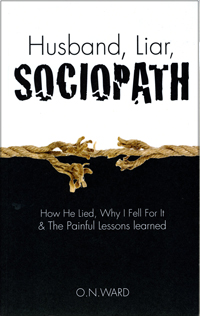 By Mary Ann Glynn, LCSW, CHT
By Mary Ann Glynn, LCSW, CHT
After being in a relationship with a sociopath, clients are often conflicted by the idea of forgiveness as recommended by their faith system (I checked and all the world’s major religions admonish to forgive) as opposed to the perpetual anger they feel. As therapists, we never pressure someone who has been abused to forgive their perpetrator, because we don’t want to minimize the impact of that abuse. While someone is moving through the emotions of healing from abuse and trauma, they are going to experience quite a bit of anger, even rage, which can hang around for a long time.
Is there such a thing as having too much anger? So when and how do we know how to get past it?
In order to deal with abuse – any kind of abuse, whether emotional, physical, sexual, deceit – and deal with the traumatic effects of it, first we have to bring it forward. While still dealing with an abusive situation we usually don’t bring it forward, we just find ways to endure/survive it by pushing down our emotions. This includes some form of dissociation – a disconnection from our painful emotional and bodily experience. It is a survival response to threat. Dissociation can range from mild spaciness to full-fledged disconnection from the body and mind for periods, depending on the severity and extent of helplessness the victim experiences. Even if a person fights the abuser back, afterwards the person still has to glaze over, deny the emotional and physical pain, in order stay in the relationship. Otherwise, those feelings will be ever present and overwhelming, and would force the person to leave. This is what does finally happen in the end.
Because of this need to dissociate in order to endure/survive an abusive situation, we often have a delayed reaction to being victimized. It is often only when we’re away from the abuser and get clarity that the impact of the violation hits us. While in the situation we don’t allow the impact of the violation to stay in our consciousness, but subconsciously it’s internalized. Once we’re not dealing with abusive environment on a daily basis, the normal human reaction to being violated – anger – will surface. Anger is the emotion that reacts to protect us from threat and harm. It is part of the human survival response. When someone violates your space and puts you in harm, anger is the self-protective mechanism that kicks in. For instance, if someone knocks into you and you’re in danger of falling and hurting yourself, before you even think about it, a surge of energy will try to push the person off you.
Feeling the anger helps us go from feeling a helpless to feeling indignant at the violation. That’s empowering and a step in the right direction. Previously we had to suppress the natural anger that could have protected us, with many consequences to our emotional, physical, and spiritual well-being. So, if you’re experiencing a simmering indignation or white hot rage, let it through! Feel it fully. Let the energy out in exercise that’s strenuous, or kickboxing, or drumming, screaming, journaling, verbal expression, or releasing techniques with your therapist. Your emotions and body need to fully register the feeling of violation to protect you against someone in your future who crosses your boundaries, is abusive or controlling.
In fully feeling the impact of the violation that happened to us it will eventually give way to learning about ourselves and the dark side human nature, and how to go forward from here in a safe, protected way. The antidote to violation isn’t forgiveness, it’s fearlessness. The need to rescue ourselves from being violated should form a strength that was not there before. And only from that place of strength we can let our guards down, let go of the pain and anger, and heal.




































 The Swinging Female Psychopath And The Partner Left Behind: When The Fog Lifts
The Swinging Female Psychopath And The Partner Left Behind: When The Fog Lifts
Sunnygal
For me, it helps to not take it personally. The disordered person is acting out the disorder.
lexy
I had my share of 2 years with a sociopath, though I have to admit it might not have been the worst one, after reading so many stories. I always knew he had issues, but I only truly realized he is a sociopath immediately after I broke contact last time. Been back and forth at least 6 times in that vicious circle, but I decided this time is the last time.
He is still in my mind most of the time, I have short moments when I am missing him or at least the him that I thought and wished he was. Yes I have been angry, yes it hurts a lot, Yes, I try not to take it personally, but then again it’s not that easy considering how personal it was for me.
The good part is that I realize how questioning about him only made me question some of my reactions to him as well and ended up knowing myself more. I can see how I am better everyday, more detached and calm and I realise that time does heal.
One thing that I did not want to have is regrets, and to be honest I don’t think I do. I mean yes, overall I would never ever want to be In this kind of experience again, but looking on the bright side, I had some beautiful moments on this crazy ride and for those I am thankful. Even if those beautiful moments where not real to him, they where to me. And what else is life if not our own perception of reality ? Why would those moment be less if in that moment in time I felt happy, no matter how he felt or better said how he didn’t feel.
I’m not saying it’s worth the downside or that anyone should seek happiness this way. It’s just that for me personally, knowing that I had good moments makes me see this experience in another light. Not to go back to it, but enough not to resent 2 years of my life.
regretfullymine
I went through endless fears; fear of chance encounters with him, in the small town or on the roads where I live. Fear of walking into a business, the courthouse, anywhere that he might likely appear..it took a LONG time to get through those fears; then I went through being angry, and MAD at him, MAD at ME for living with him for so many years, being blinded by his ‘lovebombing’, at being too weak/foolish/stubborn refusals to listen to others. MAD at our sons for believing his lies about me and my family. I still get angry at times, old painful memories still surface, and then the anger bubbles up. Its been years now, since my divorce; and I can STILL get angry.
junebug
I don’t feel any anger, really. Maybe the occasional twinge of bitterness. I’m not sure if it’s going to eventually hit me like a proverbial ton of bricks or it’s something I simply will not experience because of my own psychological abnormalities.
Honestly, I hope I don’t ever feel it. Anger makes people irrational. And that’s dangerous.